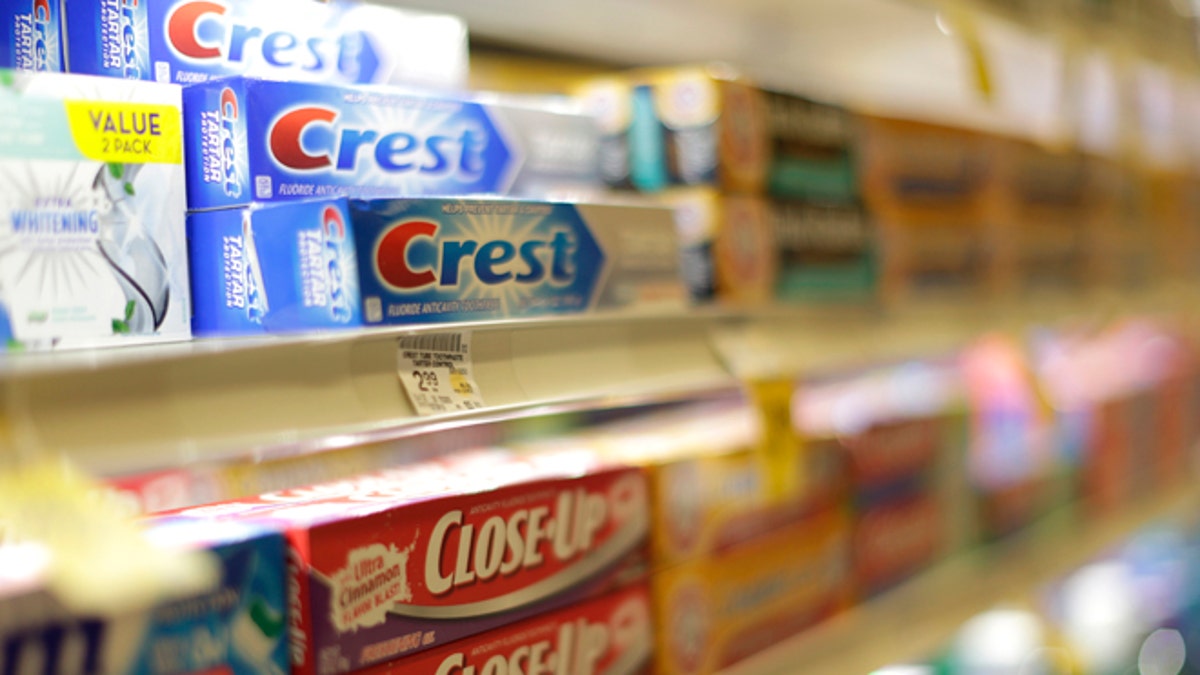
Feb 13, 2015: Toothpastes are seen at the Safeway store in Wheaton, Maryland. (Reuters)
Environmentalists are beaming after California Gov. Jerry Brown agreed to sign legislation that bans soap, toothpaste and body wash that contain so-called microbeads -- a move that puts added pressure on the industry nationally to phase out the products.
The law, which will be imposed in 2020, bans the tiny exfoliating plastic beads that are common in many hygiene products but also are showing up inside fish and other wildlife. Environmentalists say the beads are easily passing through water filtration systems without disintegrating.
“A recent study found a staggering amount of micro-plastic pollution in the San Francisco Bay but these beads have also been found in the open ocean, rivers and the Great Lakes,” bill sponsor Assembleyman Richard Bloom said in a statement, calling the beads a “pervasive source of plastic pollution.”
Industry groups originally fought past versions of the legislation and have argued that the dangers of microbeads are overblown. On its website, Procter & Gamble describes the microbeads as “completely safe.”
However, amendments to the California measure prompted some business critics to drop their opposition. And with legislative pressure growing, major companies are finding alternatives to microbeads, including natural substances such as ground-up fruit pits.
Procter & Gamble told FoxNews.com in a statement that they are “actively working” to replace microbeads with alternatives. The company downplayed the notion that the change would have a significant effect on business, and noted there were already alternatives available for customers.
“In the meantime we already have plenty of product options available without microbeads for those who would prefer them. Our goal is to complete removal of microbeads from all of our products by 2017,” a spokesman for the company said.
California becomes the ninth state to ban the microbeads, with the Michigan legislature also considering a ban, The Detroit Free Press reports. But California is the largest state to do so, and environmental groups hope the policy will be imitated nationwide.
“Intentionally adding tiny bits of plastic to toothpaste and face soap that gets washed down the drain seems crazy,” Mark Murray, executive director of Californians Against Waste, told FoxNews.com. “We know that this material has been polluting the water we drink and the fish that we eat. California’s legislation will prohibit this practice and likely become the de facto national standard.”
Bloom said the California bill was "carefully crafted to avoid any loopholes that would allow for use of potentially harmful substitutes."
Some companies had anticipated the move and already started phasing out microbeads entirely from their products.
“In 2013, the Johnson & Johnson Family of Consumer Companies, announced that we are phasing out and will eliminate the use of polyethylene microbeads in our personal care products by the end of 2017. We have stopped developing new products containing polyethylene microbeads and have been conducting environmental safety assessments of other alternatives," a spokesman for Johnson & Johnson told FoxNews.com.
Other companies have already stopped using the microbeads altogether. A spokesman for Colgate Palmolive told FoxNews.com that, in response to concerns from customers, they have stopped using microbeads as of year-end 2014.
FoxNews.com's Adam Shaw and The Associated Press contributed to this report.




